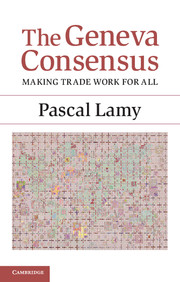Book contents
- Frontmatter
- Contents
- Preface
- 1 Harnessing globalization amid the crisis facing multilateralism
- 2 The changing face of trade
- 3 Helping the poorest up the prosperity ladder
- 4 Trade: friend not foe of the environment
- 5 Trading towards global food security
- 6 Trade can contribute towards better health
- 7 Trade and labour: separated at birth, but still connected
- 8 Trade and energy: the case for a greater WTO role
- 9 Trade and currencies: trading community seeks greater currency stability
- 10 Trade and competition: fairer competition makes for fairer trade
- 11 Trade and human rights: a case of misplaced suspicion
- 12 Corruption: a cancer that trade transparency can help to treat
- 13 Last but not least: the Doha Round
- Epilogue
- Index
4 - Trade: friend not foe of the environment
Published online by Cambridge University Press: 18 December 2013
- Frontmatter
- Contents
- Preface
- 1 Harnessing globalization amid the crisis facing multilateralism
- 2 The changing face of trade
- 3 Helping the poorest up the prosperity ladder
- 4 Trade: friend not foe of the environment
- 5 Trading towards global food security
- 6 Trade can contribute towards better health
- 7 Trade and labour: separated at birth, but still connected
- 8 Trade and energy: the case for a greater WTO role
- 9 Trade and currencies: trading community seeks greater currency stability
- 10 Trade and competition: fairer competition makes for fairer trade
- 11 Trade and human rights: a case of misplaced suspicion
- 12 Corruption: a cancer that trade transparency can help to treat
- 13 Last but not least: the Doha Round
- Epilogue
- Index
Summary
In June 2008, to coincide with the trade ministers’ conference being held in Geneva, a non-governmental organization (NGO) called Oceana plastered the city with posters bearing the words ‘WTO, please save our fish’. They were asking for the WTO’s help in resolving the damaging environmental problem of overfishing. What a sea change from the views many NGOs expressed – sometimes violently – at a similar ministerial conference in Seattle in 1999. There the WTO, with its advocacy of open trade, was accused of abetting the wholesale ‘murder’ of dolphins and turtles. In just a few years the WTO had moved from being the villain of the hour, when it came to environmental protection, to a potential saviour. It had become a place where activists believed that the environment could be defended, where fish could be protected.
This is a far fairer view because, contrary to the lingering perception of some, trade can be a friend, and not a foe, of conservation. Trade opening has much to contribute in the protection of the environment and the fight against climate change. The founding fathers of the organization were adamant that sustainable development must lie at the very core of its mission, because only then would trade enhance human welfare. Sustainable development that ‘protects and preserves’ the environment is enshrined as a goal in the opening paragraph of the Marrakesh Agreement of 1994 that gave birth to the WTO. And there is no bigger challenge to sustainable development today than climate change.
- Type
- Chapter
- Information
- The Geneva ConsensusMaking Trade Work for All, pp. 55 - 67Publisher: Cambridge University PressPrint publication year: 2013



